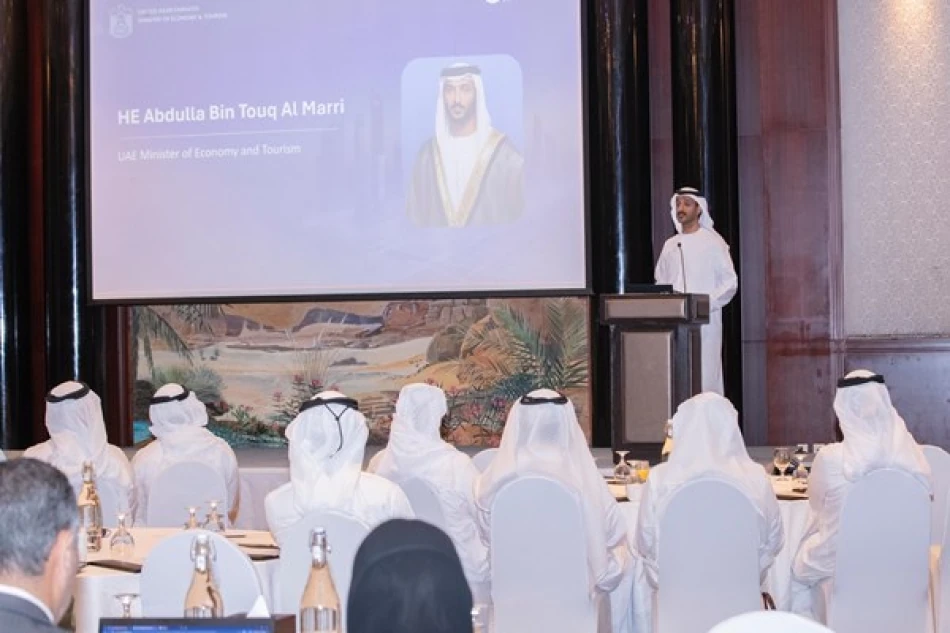
UAE Ministry Unveils Next Phase of Comprehensive Economic Policy Overhaul
UAE Launches Ambitious Phase Two of Economic Policy Overhaul with OECD Partnership
The UAE Ministry of Economy and Tourism has unveiled the second phase of its comprehensive economic policy development project, deepening its partnership with the OECD to modernize legislation and enhance business competitiveness. This strategic move positions the Emirates to achieve its ambitious goal of becoming the world's leading nation in proactive economic legislation by 2031, while strengthening its role as a regional hub for public-private collaboration.
A Legislative Transformation Already Underway
The UAE's economic transformation is gaining momentum through systematic policy reform. Over the past four years, the country has developed more than 30 economic laws and decisions, creating a legislative framework that now supports over 1.1 million companies and economic institutions. This regulatory overhaul has positioned the UAE as an increasingly attractive destination for global investors and entrepreneurs.
Minister of Economy and Tourism Abdullah bin Touq emphasized that the UAE now possesses an "advanced and pioneering economic legislative environment" that has undergone qualitative leaps in policies and legislation. This foundation provides the springboard for the more ambitious second phase of reforms.
Strategic Focus on Tourism Integration and Data-Driven Policies
Enhancing Tourism Governance
The second phase centers on two critical pillars. The first focuses on strengthening governance and institutional integration within the UAE's tourism ecosystem. This approach recognizes tourism as a key economic driver that requires sophisticated policy coordination across multiple government levels and stakeholders.
The initiative emphasizes developing robust data infrastructure as a cornerstone for evidence-based policymaking. This data-centric approach mirrors successful models in Singapore and other advanced economies, where comprehensive data collection enables more precise and effective policy interventions.
Sustainability as Economic Strategy
The tourism component also prioritizes sustainability elements to ensure continued growth while achieving broader economic and social impact. This aligns with global trends where sustainable tourism policies are becoming essential for long-term competitiveness, particularly as international travelers and investors increasingly prioritize environmental and social responsibility.
Regional Leadership Through Business Advisory Council
The second pillar involves hosting a Business Advisory Council (BAB) forum in Dubai before year-end, representing a significant expansion of the UAE's regional influence. This council serves as the primary dialogue platform between public and private sectors within the OECD's Middle East and North Africa Competitiveness Programme.
By hosting this forum, the UAE positions itself as a regional policy hub, facilitating integration across MENA markets while enhancing private sector participation in policy formulation. This approach could accelerate economic integration across the region, potentially creating larger, more competitive markets that benefit UAE-based businesses and investors.
Market and Investment Implications
For investors and businesses, this policy evolution signals several important developments. The systematic approach to legislative reform, backed by OECD expertise, suggests more predictable and internationally aligned regulatory frameworks. This reduces regulatory risk for foreign investors while potentially improving the UAE's rankings in global competitiveness indices.
The emphasis on data-driven policymaking also indicates more sophisticated economic management, which could lead to more targeted support for specific sectors and more efficient resource allocation. Companies operating in tourism, technology, and financial services sectors may particularly benefit from these enhanced policy frameworks.
Global Context and Competitive Positioning
The UAE's partnership with the OECD reflects a broader trend among Gulf states to align with international standards while maintaining competitive advantages. Unlike some regional competitors that focus primarily on mega-projects or resource-based development, the UAE's approach emphasizes institutional quality and regulatory sophistication.
This strategy positions the UAE to compete more effectively with established financial and business hubs like Singapore and Hong Kong, while potentially attracting businesses seeking alternatives to traditional centers due to geopolitical concerns or regulatory changes.
The Path to Global Leadership
The UAE's stated goal of achieving the world's top ranking in proactive economic legislation by 2031 represents an ambitious but achievable target. The systematic approach, international partnerships, and focus on evidence-based policymaking provide a solid foundation for this objective.
Success in this endeavor could establish the UAE as a model for other emerging economies seeking to modernize their regulatory frameworks while maintaining rapid economic growth. The integration of sustainability principles with business competitiveness also positions the UAE to capitalize on global shifts toward more responsible business practices.
Most Viewed News

 Layla Al Mansoori
Layla Al Mansoori






